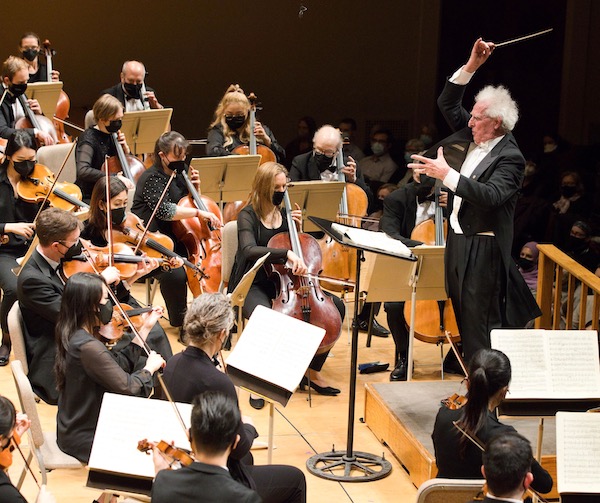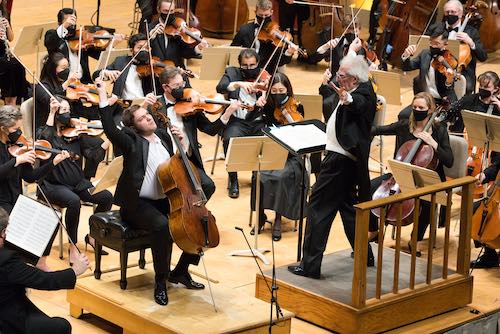Zander, Boston Philharmonic bring fresh vitality, insight to Beethoven’s “Eroica”

Benjamin Zander conducted the Boston Philharmonic in Beethoven’s Symphony No. 3 Sunday at Symphony Hall. Photo: Hilary Scott
Since returning to action last fall, the Boston Philharmonic Orchestra’s programs have stuck firmly to the canonic mainstream. But their performances of familiar pieces by Bruckner, Brahms, and others have been anything but rote.
So it was again on Sunday afternoon at Symphony Hall when the BPO and music director Benjamin Zander presented Ludwig van Beethoven’s Symphony No. 3.
The “Eroica” Symphony is, of course, an orchestral staple and the challenge of making this 1804 score sound fresh, novel, or revolutionary is a real one.
Yet Zander has always had a singular way with Beethoven’s music. In his hands, its tempos tend to move flexibly, rhythms snap, and textures unfold transparently. On its own, this approach often helps revitalize Beethoven’s well-known themes and motives. But, more significantly, it usually presents them in new-sounding contexts that shine lights on hidden aspects of form, structure, and phrasing.
Sunday’s vigorously coherent rendition of the Third was largely in that tradition. Tempos drove from the first movement’s slashing downbeat yet everything was firmly controlled. The triadic main subject never lost its dancing impetus, while the music’s play of colors—especially the busy woodwind writing in the exposition and the sonorous horn scoring in the coda—shimmered.
Just as striking was the Adagio. Here, again, rhythms were biting and Zander boldly underlined the movement’s “assai” marking. Accordingly, the Funeral March’s unsettling, disjunct structure–particularly the breakdown of the principal figure over its second half–came out strongly.
The music’s expressive range was correspondingly wide. Its bleak ritornellos were countered by soaring, major-key apexes and, in the fugue, orchestral playing of haunting smoothness. Indeed, the strings’ legato articulation during the last gave this section a conspicuously heartfelt, mournful tone.
Zander drew playing of real spirit from the BPO in the boisterous Scherzo, while the finale drove with swaggering character. The latter’s contrapuntal episodes, taken just this side of frenetic, revealed a turbulence that doesn’t always register in the movement. And the penultimate Adagio variation, unfolding resplendently, served as a majestic lead-in to the blistering, closing Presto.
If the “Eroica” ended in a blaze of unconditional triumph, the BPO’s account of Dmitri Shostakovich’s Cello Concerto No. 1 was, fittingly, more ambivalent.

Andrei Ioniță performed Shostakovich’s Cello Concerto No. 1 with Benjamin Zander and the Boston Philharmonic on Sunday. Photo: Hilary Scott
Shostakovich wrote the piece for Mstislav Rostropovich in 1959. Though coming from a relatively stable period in his life politically, the concerto bears the scars of the composer’s ominous relationship with Stalin and his cultural henchmen.
Sunday’s soloist, the Romanian-born Andrei Ioniță, certainly had the music’s notes in hand. Gold Medalist in the 2015 International Tchaikovsky Competition, Ioniță played the first movement’s opening bars with a taut, dry style while he imbued the Moderato’s refrains with lyrical warmth.
In general, his feel for the concerto’s introspective moments was most affecting: the second movement’s artificial harmonic passagework and the cadenza’s probing first half were particularly well-colored.
While its extroverted bits might have benefited from a touch more savagery (in the Allegretto) and fervency (the finale’s first pages), Ioniță effectively conveyed the music’s underlying sense of unsettledness.
Meantime, the BPO provided an accompaniment that discreetly illuminated the music’s motivic organization. In particular, the woodwind and horn sections fired their interjections with immediacy and Zander’s direction of the Moderato’s hymn-like sequences glowed.
Afterwards, Ioniță offered a pair of encores. The first, Sulkhan Tsintsadze’s all-pizzicato Chonguri, was dispatched with improvisatory gusto. Meanwhile, the Bourrée from Bach’s C-major Cello Suite sang sweetly.
Prefacing the Shostakovich was the Prelude from Modest Mussorgsky’s opera Khovanshchina.
A delicate essay depicting dawn over the Moscow River, the BPO’s account of this curtain-raiser was aptly serene, highlighted by intensely focused string tremolos and fluently dovetailed woodwind lines. For five minutes at least, both the harrowing world of Shostakovich and the tumult of Beethoven were held at a distance.
The Boston Philharmonic Orchestra performs Gustav Mahler’s Symphony No. 3, 8 p.m. April 8 at Symphony Hall. bostonphil.org
Posted in Performances